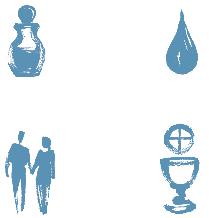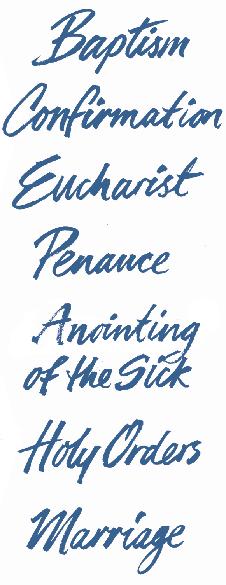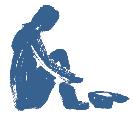WHAT CATHOLICS BELIEVE
An introductory booklet series

God's Life In Us
Introduction
Meeting Jesus in the Sacraments
Baptism – The Foundation Sacrament
The Gift of New Life
Confirmation and the Gift of the Holy Spirit


WHAT CATHOLICS BELIEVE
An introductory booklet series

God's Life In Us
Introduction
Meeting Jesus in the Sacraments
Baptism – The Foundation Sacrament
The Gift of New Life
Confirmation and the Gift of the Holy Spirit

God has a plan for freeing the world from sin and death, but so many things demand our attention that it isn’t surprising if we overlook the essential fact that we are part of that plan. Yet we should never forget such remarkable and exciting news. It should make us joyful and eager to share our excitement with others.
In the previous pamphlet it was said that Jesus founded a community of believers so that people might listen to his teaching, come to know him and share in his love. He wanted each of us to be sure that he truly loves us. We need to know of his love because we need to know that someone loves us without any reservations. Jesus loves us to the extent of dying for us – and no one else could possibly love us more.
When we look for signs that God loves us we will find them dotted throughout our lives and the lives of others. But we want something more direct than that. We need to know that God forgives our sins now, that he really draws us into his family, and looks after us in the course of our lives.
This may seem a very human way of looking at religion. But we are truly human – and God treats us as humans. God so respects our humanity that he became one of us and lived in our world. Jesus really was a person, one of us, even though he was God. Our human life has been blessed and made sacred in a remarkable way.





Catholics believe that Jesus left us seven signs that flare brightly against the background of life. They are called sacraments. They bring us the love, life and power of Jesus Christ and link us more closely to him and to his Church.
Through the sacraments, our faith and love allow us to meet Jesus. All of the sacraments provide us with the help we need to change our attitudes and actions, but some of them give us a permanent relationship with Jesus and the Church. For example, the Sacrament of Confirmation gives us the desire and energy to be true witnesses of Jesus and to live by the Good News he brought. The Sacrament of Orders is given to those who are called to work as priests in the service of the Gospel. These sacraments can be received only once for they make a permanent change in us.
The first sacrament received by Catholics is the Sacrament of Baptism. This, too, can be received only once. This is the ceremony by which Jesus joins us to his people and makes us members of his Church. It is the first and most necessary sacrament, for without it we are not able to receive any of the others. We shall see more about it later in this booklet.
Perhaps we shall understand the sacraments more easily if we look back at the life of Jesus. When he lived on earth people crowded around him. They heard him speak words of forgiveness to sinners, and they saw him bless people. The sick touched him and were cured. They felt his power when he healed them of illness, disease and disabilities, a permanent change in us
and they realised that God’s power was in him and working through him. The extraordinary instant cures, which couldn’t be performed by others and certainly couldn’t be explained in any natural way, are called ‘miracles’. These miracles were important in themselves, but they were also signs of the remarkable work he came to do – through them he invited people to turn back to God by rejecting their sins. (The Jewish people thought of sin as being closely connected with sickness and death.)
Jesus has left our earth, so that we no longer hear or touch him. But he is still with us in his Church. It is mainly through the sacraments that he reaches out to us. Through them we come into contact with him – just as the people of his own time did. That thought is very exciting. No matter where or when we live, Jesus comes to us through the sacraments so that we might draw his life and gifts into our lives, so that we can be set free from sin and death. There is an unbreakable link between Jesus, his Church, the sacraments – and those who receive them.
In the sacraments ordinary substances are used to make us holy. These substances, all of which we know well, are used to bring into our lives the loving care of Jesus.
In the Sacrament of Baptism, for example, it is water. We use water for washing ourselves and our clothes, for drinking and for cooking things in, for helping plants to grow. Water is necessary for our lives and for our work too. In the same way, it is used in Baptism as a sign that God’s work is done in us and that we have been given a new life. It makes us able to join the community of those who believe in and work for God’s kingdom. The fact that water is commonly available is a sign that, in Baptism, God’s love is also commonly available.
People with sore muscles may rub them with a healing oil. That is why oil, so commonly available, is used in the Sacrament of Confirmation. There it is an outward sign


ordinary substances are used to make us holy

that we have been strengthened (confirmed). Through the power of the Holy Spirit the sacrament gives us strength to lead a Christian life – just as the apostles received power when the Holy Spirit came upon them immediately before Jesus returned to his Father.

These common things which are used in the sacraments are accompanied by special words of faith and blessing so that they (both words and actions) are signs and the cause of what happens – Jesus comes to us, strengthens us and sets us free. They are outward signs of the inward change which Jesus brings about in us through the sacraments.
There are seven sacraments. They are called Baptism, Confirmation, Eucharist, Penance, the Anointing of the Sick, Holy Orders and Marriage. Each of them will be treated separately. But they have much in common; for example, they link us today with the power of the life, death and resurrection of Jesus two thousand years ago. They tell us of the glory which will be ours one day when we rise out of death to be with God forever, and they prepare us for that day. Each of them gives us the new life we call ‘grace’, and draws us closer together as the People of God.
Baptism gives us this life for the first time. That is why, together with the Sacrament of Confirmation, it is referred to as a Sacrament of Initiation. The Sacrament of Penance gives it back to us if we lose it through sin. The other sacraments all increase God’s life in us. They make us ‘full of life’, more active when we express our love for God and people through the truthful words we speak and the just actions we do. They bring us the help we need to handle the important events of our lives. God never forgets us.
The sacraments give us ‘grace’, which is a sharing in the very life of God. By grace we receive the gifts of God’s mercy and freedom. From this mercy many other gifts flow, and every gift is related to the new life that Jesus came to give us. We have no right to these – just as we have no right to any gift we are given. But because God loves us so much (and so wants our friendship) he provides these loving gifts so that we can live fuller and better lives. They draw us into the life of Jesus.
But the sacraments don’t work if we don’t do our part. They don’t just fill us up with gifts automatically – like pouring petrol into the tank of a car. Each sacrament is an invitation from Jesus, and we have to answer it with faith and love. If we believe that we meet Jesus in the sacraments and if we respond lovingly to that meeting we will receive grace. It is Jesus who baptises us; it is Jesus who forgives sin in the Sacrament of Penance; it is Jesus who, in the Sacrament of the Sick, brings comfort and strength to people who are ill. Naturally, because we meet Jesus in the sacraments, we treat them with great respect. By means of prayer and by thinking about God’s love and mercy we prepare ourselves to receive them. Even if we receive a sacrament often (like the Sacrament of Penance or the Eucharist) we will still want to prepare carefully. The sacraments aren’t an excuse to live carelessly – it would be wrong to think that they will make up in us what we ourselves fail to do.
So when we receive a sacrament we will want to praise and thank God for his gifts; we will want to use those gifts generously to benefit other people. God gives us his life in the sacraments. They are where we meet Jesus. What a remarkable gift that is!


B aptism (sometimes called ‘christening’) is the first and the most necessary of the sacraments. The most important moment in the giving of this sacrament occurs when the person baptising pours water over the head of the person receiving baptism, saying, ‘I baptise you in the name of the Father and of the Son and of the Holy Spirit.’ In the Catholic service of Baptism other ceremonies are added before and after to help us understand better what Baptism does for us. There are readings from the Bible, prayers and blessings, anointing with oil to bring strength and to show that the person has been especially selected for a special task –all things which show that the person is now really a follower of Christ and a member of the Church.
Jesus is the only way to true life. ‘I am the Way, I am Truth and Life’ (Jn. 14:6) he once said. But he also told Nicodemus how this would come about: ‘… no one can enter the kingdom of God without being born through water and the Spirit’ (Jn. 3:5). When he said this he was speaking about Baptism.
Then again, before he went back to his Father, he told his apostles to go out among people everywhere and ‘… baptise them in the name of the Father and of the Son and of the Holy Spirit’ (Matt. 28:19). It was such a clear and urgent command that the apostles obeyed it without question. On the Sunday we now call Pentecost, when St Peter was telling the people the Good News that Jesus had come to free them from sin and death, some of them asked, ‘What shall we do?’ Peter’s reply was straightforward:
‘… you must repent, and every one of you must be baptised in the name of Jesus Christ for the forgiveness of your sins, and you will receive the gift of the Holy Spirit’ (Acts 2:38).
The Church has said and done the same thing ever since.
The word ‘baptise’ comes from a Greek word which means to plunge into water. Washing – as a sign of making ourselves clean – has been a feature of many religions. The Jewish people, for example, often used water in their ceremonies, and the Bible shows the deep meaning which water had for them. In the story of the creation of the world which we find in the Book of Genesis we read how the Spirit of God moved over the nameless waters, bringing into existence the whole of our world, and how God’s process of creation ended with the creation of human life.
Later in the Bible we read of Noah and the flood. Later again the Book of Exodus tells how the Jewish people escaped from the Egyptian armies when the waters of the Red Sea parted to allow them to travel safely through. In all of these stories the idea of being set free by means of water is being emphasised. God’s use of water to save the Hebrew people became central to their lives and to the history which is written down in the Old Testament. They never forgot how they reached the Promised Land by making their way through the waters of the Red Sea.
Jesus often spoke about water when he was teaching. There is, for example, the Gospel story of his talk with the Samaritan woman (see Jn. 4:1-42). We are told that he was resting beside a well when a woman came to draw water there and he asked her to give him some to drink. She was widely known as a sinner and he wanted to bring her to love God, but she did not realise that at first. He spoke to her about the new life that he had come to bring – but he did it in terms of the water which she was drawing from the well:
'Whoever drinks this water will be thirsty again; but no one who drinks the water that I shall give will ever be thirsty again: the water that I shall give will become a spring of water within, welling up for eternal life' (Jn. 4:13-14).


In the desert of Judea, John the Baptist taught that Baptism was necessary for a person who wanted to turn away from a sinful life and live a new life centred on God. Jesus himself chose to go to the River Jordan to be baptised by John – showing how important he thought it was. He had committed no sins, but he wanted to show that Baptism brought people into a new relationship with his Father. St Paul was clearly thinking about this when he wrote:
You cannot have forgotten that all of us, when we were baptised into Christ Jesus, were baptised in his death. So by our baptism into his death we were buried with him, so that as Christ was raised from the dead by the Father's glorious power, we too should begin living a new life (Rom. 6:3-4).
St Paul tells us that, by means of the waters of Baptism, sin and death are destroyed and we rise to a new life, sharing in the resurrection of Jesus. Those who are baptised become part of the great mystery of the dying and rising of Jesus. What this means is summarised by St Paul in a wonderful passage which is read during the Church’s celebration of Easter:
Since you have been raised up to be with Christ, you must look for the things that are above, where Christ is, sitting at God’s right hand. Let your thoughts be on the things above, not on the things that are on earth, because you have died, and now the life you have is hidden with Christ in God. But when Christ is revealed – and he is your life –you too will be revealed with him in glory (Col. 3:1-4).
His statement gives us an excellent platform on which to build our hopes for a life in which our deepest hopes are truly fulfilled, and for a peaceful and accepting death.
The Dead Sea Scrolls are documents dating from about the time of Jesus, two thousand years ago. They were found in caves near the shores of the Dead Sea. They tell us of a group of Jewish people whose members practised a ceremony of baptism which, in some ways, was similar to ours. John the Baptist may have had some contact with them – perhaps that would explain why he baptised people.
Great crowds came to John beside the River Jordan, where he talked to them, asking them to be truly sorry for their sins and begin to live a new life. As a sign that they had changed the way they lived he told them to admit their sins and be baptised in the water of the river. Great numbers of people heard what he had to say and asked to be baptised.
One day Jesus came. John objected when Jesus asked to be baptised, because he realised that his visitor was a far greater person than he was:
‘It is I who need baptism from you, and yet you come to me!’ (Matt. 3:14).
But Jesus insisted and so John baptised him. The Bible tells us that when Jesus came out of the water after his Baptism the Spirit of God descended on him like a dove and that a voice said from heaven,
‘You are my Son, the Beloved; my favour rests on you’ (Mk. 1:11).
The baptism of Jesus began a new stage in his life. Before it he had been a carpenter from Nazareth. But now he became a teacher, making known the Good News of who he really was and what he had really come to do. The way we put it now is that he is the Son of God who became a human being to save us from sin and bring us to God, our Father.



The baptism of John was not the same as the Christian ceremony of Baptism, but looking at what happened when Jesus was baptised helps us to understand what the Sacrament of Baptism means. It is important that we understand this particular sacrament because it is the means by which we become Christians.
What God does for us in Baptism changes us, making us able to receive his other gifts, and preparing us to live as members of his Church. But the most remarkable effect of Baptism is that it makes us children of God. St John wrote about that in his first letter (see 1 Jn. 3:1). When we were born we became natural children of our parents. But by means of Baptism we are adopted as God’s children. When a husband and wife adopt a child they give it their name and make it part of their family. In law and in the eyes of everyone the adopted child becomes just as much part of their family as any of the other children they may have.
God does the same for us. He makes us brothers and sisters of Jesus, part of his family, which we call the Church or the People of God. He invites us to live a life as a member of his family and to share with him the joy of his life in heaven. So, as a result of our baptism our relationship with God becomes remarkably real and intimate. Jesus told us that when we pray we should call God, ‘Our Father’. That is a further sign of the fact that we become members of God’s family.
But how can we become part of God’s family when God is so different from us? The answer to this question is found in our other relationships. For example, children come to share many of the ways of living and acting which their parents have. So, if we are God’s children we must in some way share in the way God is and the way God acts. The New Testament tells us that we are God’s children, that he does adopt us and share his own life with us:
By his divine power, he has lavished on us all the things we need for life and for true devotion, through the
knowledge of him who has called us by his own glory and goodness. Through these, the greatest and priceless promises have been lavished on us, that through them you should share the divine nature and escape the corruption rife in the world through disordered passion (2 Pet. 1:3-4).
If we are to say anything more about how God adopts us into his family, we need to think about God’s wonderful plan for us. In order to adopt us, God changes us through the Sacrament of Baptism, making us like him. The possibility of this happening is found in all of us, for the Book of Genesis tells us that we are created with the likeness of God. Now we, sinners ourselves and members of a sinful society, are given new dignity through Jesus Christ. St Peter said that we ‘share the divine nature’. This happens when we are baptised. God shares his life with us, making us members of his family, and so we become his children.



you should share the divine nature
Jesus said to Nicodemus that in Baptism we are born again. When we were born the first time we became children of our parents. In Baptism we are given a new life as members of God’s People, and we share God’s life as his children. Baptism makes us members of the Church. To become a member of the Church is to be changed, so that we are really different from others. We become a branch of the vine and, as a result, are joined to Jesus Christ – that is how Jesus himself explained it when he said,
‘I am the vine, you are the branches. Whoever remains in me, with me in him, bears fruit in plenty…’ (Jn. 15:5).
The same life flows through the branches as through the stem. And the same life of God which is in Jesus Christ gives life to us as well. Because of this new life in us we become members of the People of God who are bound into a wonderful agreement with God.
Some of what has just been said may help explain what is meant by the word ‘christening’, which is sometimes used for Baptism, for when we say that a person has been christened we mean that the person has become ‘like Christ’. Christ was the beloved Son of God. So those people, the ones who are christened, become sons or daughters of God because they are now like Christ.
Because Baptism gives us a new life it also gives us new powers – especially the power to know God in the way in which Jesus knew God. We call this power faith. It is by means of faith that we believe not only in the things which Jesus tells us about God, but, above all, in a loving,
compassionate person who is our God. We can’t see God, but Jesus Christ has made God known to us and the Church continues to make God known. By faith we are able to believe what God teaches us through the Church, and, as believers, we come to know and love God and his teaching.
Jesus said, ‘I am Way, Truth and Life’ (Jn. 14:6). We can’t come to God except through Jesus. Faith is God’s contract with us and our contract with God. It is something which allows us to believe, but, more than that, it is a genuine experience in itself, an experience of meeting a loving friend. St Paul had an experience of this kind and it changed his life.
By means of Baptism we receive the power to love God more than everything else and with the love such as Jesus has for his Father. It also helps us to love others because we know that God loves them. It causes us to realise that we are all members of one family, a family for which Jesus died. Christians are called to see and find Jesus in all men and women. This is not always easy. In fact, because we sometimes find it difficult to summon up love for God and for people, we are given another gift at Baptism. This gift is called hope. By it we receive the power to place all our trust in God.
Hope makes us confident, helping us through the bad times. It assures us that we will receive all the help we need and that, in the end, God will bring us to the happiness of heaven. We are confident that he will do this because of his love for us.
We believe in God because of what he tells us, because of what he has done for us, and because we know that on our own we can achieve so very little. He knows all things and wouldn’t deceive us, yet in itself that may not seem enough. That’s where hope comes into play – and we can place our hope very securely in God because he is faithful and allpowerful. With faith and love firmly set within us, we can




love God and people. Our gifts of love to God and others are our response to God’s love for us, his love within us.
Faith, hope and love are planted like seeds in human beings at Baptism. As we go through life these powers should flower and bear fruit in us. It need not be difficult – Catholics believe that God is very near, helping them to grow in the love and knowledge of Jesus Christ, helping them to live like him.
God is so close to us that we can truthfully say he lives in us. Jesus told this to his companions:
'Anyone who loves me will keep my word, and my Father will love him, and we shall come to him and make our home with him' (Jn. 14:23).
What Jesus is saying is that God has come so close to us, his people that he can be said to live in each of us. Every Christian who believes in the teaching of Jesus Christ and who follows the Christian way of life provides a home for God. Such Christians are the dwelling-places of the Holy Spirit.
God is not in some remote place millions of miles away. He is among us and within us as our greatest friend, our closest companion, as we make our journey through life.
When we sin we turn away from God. We refuse to love God or live as we are supposed to live. Every sin is a deliberate choice to knowingly and willingly reject what God wants of us. Instead of living in the way we should,
we choose to do what the selfish side of us wants to do instead. Sin has no place in the life of a Christian, for it denies all that Baptism means. It destroys the life of God in us, and breaks our close relationship with God. We say that the waters of Baptism ‘wash away’ sin because they not only cast out the original sin which we all inherited, they also wipe out the later sins which an adult person may have committed before Baptism. Of course, we must be sorry for them and turn back to God to receive God’s forgiveness.
At the time we are baptised we promise to renounce a life of sin. (Godparents make this promise on behalf of little children, and are expected to be of special help to them ever after.) Adults make it on their own behalf, promising that, with God’s help, they will live lives worthy of members of God’s family. They promise to model their lives on the life of Jesus Christ, the Son of God.
In the early days of Christianity the promise to live a new life was seen more clearly in the ceremony of Baptism than it is sometimes seen now. In those times most of the people who were baptised were adults and the places of Baptism were great pools of water in which people were totally immersed. St Paul said it was like going down into the tomb with Jesus Christ who, though he died and was buried, conquered death and rose to a new life. So also, immersed in the water of Baptism, people die with Christ but then rise to the new life of the children of God. They leave the death of sin behind them in the baptismal water. They rise as Christians, members of God’s people. They take Christ as their leader, their example and their king. That is why, both in those early days and whenever it is possible in our times, new Christians were and are baptised on Easter Sunday morning, the day Jesus rose from the dead.
St Paul, one of the first to become a Christian, wrote a letter which is now part of the New Testament, and in it he said all that has been said in this booklet:



in the water of Baptism, people die with Christ but then rise to the new life
What stands out for you as most significant about the Sacrament of Baptism?
You cannot have forgotten that all of us, when we were baptised into Christ Jesus, were baptised in his death. So by our baptism into his death we were buried with him, so that as Christ was raised from the dead by the Father's glorious power, we too should begin living a new life (Rom. 6:3-4).
New members of the Catholic Church in New Zealand are confirmed shortly after they are baptised – a fact which shows how closely related Baptism and Confirmation are. In other countries there may be a period of time, sometimes years, between Baptism and Confirmation. For all that, Confirmation still completes what has begun in Baptism.
In fact the three sacraments of Baptism, Confirmation and the Eucharist (Communion) are intimately linked. A helpful image of this intimacy is that of a mother who gives birth to her child (Baptism), then holds and claims it as her own (Confirmation), and nourishes it (Eucharist). The three sacraments re-create us as children of God and ‘mother’ Church.
As we go on through life we could easily forget God and the new sense of purpose which we have as a result of Baptism. Being a Christian gives good reason for joy; yet we know only too well how many difficulties we can meet. At such times it is good to remember that Jesus told us we would be tempted to sin and that life would sometimes be an uphill struggle. He told us that because we are meant to be his true followers we would have to follow in his footsteps – and that means that sometimes we have to carry a cross, our particular share of suffering, just as he carried his (see Matt. 10:38-39).
No matter what difficulties Christians meet with, they all have the power to do what the Gospel requires and to bring to others the life of Jesus Christ – just as the apostles did. Having said that though, we still need the strength and joy that the Holy Spirit gives us if we are to live as God wants us to.
We first hear of the Sacrament of Confirmation in the Acts of the Apostles (in the New Testament).
When the apostles in Jerusalem heard that Samaria had accepted the word of God, they sent Peter and John to them, and they went down there and prayed for them to receive the Holy Spirit, for as yet he had not come down on any of them: they had only been baptised in the name of the Lord Jesus. Then they laid hands on them, and they received the Holy Spirit (Acts 8:14-17).
The second passage in which the sacrament is referred to is Acts 19:5-6.
In Old Testament times, anointing with oil was a sign of giving special powers. (It was used for the consecration of kings and queens and for the consecration of priests.) So, in New Testament times, anointing with oil, together with the laying-on of hands, came to represent the coming of the Spirit.
The Sacrament of Confirmation gives us the gift of the Holy Spirit which was sent to the apostles at the time of Pentecost, when Jesus returned to his Father. Now, as well as then, the Holy Spirit is the gift of Jesus:
'When the Paraclete comes, whom I shall send to you from the Father, the Spirit of truth who issues from the Father, he will be my witness' (Jn. 15:26).
This promise of Jesus was fulfilled at Pentecost. You may wish to read the passage which describes how the companions of Jesus were ‘filled with the Holy Spirit’ (see Acts 2:1-4).



anointing with oil
The most remarkable effect of the coming of the Spirit was that this group of fearful men was changed into a group of inspired and fearless witnesses to the life, death and resurrection of Jesus. St Paul knew how much they had changed when he quoted a passage of the Old Testament in their honour:
… their voice stands out, their message reaches the whole world (Rom. 10:18).
Confirmation is the sacrament by which the apostles and those who have come after them, by the laying on of hands and anointing with sacred oil, share with all the members of the Church the gift of the Spirit received at Pentecost. Confirmation is Pentecost given to the world and made present to every member of the Church. It is a call to extend God’s kingdom, to remain faithful to Christ’s teachings, and to hand on to others the message of salvation.
We have seen how Baptism gives us new life. This new life in us must grow just as our natural life grows. Confirmation is also a sacrament of growth, and it is a continual challenge to us to grow along with this new life in us. It is a sacrament which is given to us only once because its effects are permanent. It makes the Holy Spirit present within us, bringing us life – and therefore growth, since life is growth. Jesus wants us to grow – in fact, he compares his teaching to living things (a vine, a seed that produces a crop, a mustard seed that grows into a large plant). He challenges us to grow until we become perfect (see Matt. 5:20-48).
Confirmation helps us not to forget that challenge; it enables us to live and grow in the new life which has
become ours. It is such an exciting thought that it seems almost tragic when those who have been baptised and confirmed live very ordinary lives.
Jesus associated the gift of the Holy Spirit with the mission he gave to the apostles. In his last words he told them that they would ‘receive the power of the Holy Spirit which will come on you, and then you will be my witnesses… to the earth’s remotest end’ (Acts 1:8). By means of the Sacrament of Confirmation we receive this same Spirit so that we, too, may live and grow as a result of the new life of Christ in us, and also so that we may be loyal and faith-filled witnesses to Jesus Christ.
In the Old Testament we read how God accompanied the Jewish people on their journey through the desert as they made their way towards the Promised Land. He appeared to them under the sign of a cloud by day and a pillar of fire by night.
Christ, our Lord, is with the new People of God in their journey through life towards the fulfilment of his promise –life with him and peace forever. He is with them under new signs – not of cloud and fire, but of the seven sacraments. In all the sacraments Jesus is present with love and power as we shall see when we look at the other sacraments in later booklets. But in the greatest sacrament of all, the Eucharist (Communion), he is present in an even more wonderful way. For in this sacrament he himself comes to us and gives himself to us. We shall speak of this sacrament more fully in the next chapter.
For now though, it seems right to close with a prayer –in this case a timeless prayer which the Jewish people used long before us to celebrate with joy the wonderful things which God has done:




the greatest sacrament of all, the Eucharist
Psalm 98
Sing a new song to the [Lord] for he has performed wonders. His saving power is in his right hand and his holy arm.
The Lord has made known his saving power, revealed his saving justice for the nations to see, mindful of his faithful love and constancy to the house of Israel.
The whole wide world has seen the saving power of our God. acclaim [the Lord] all the earth, burst into shouts of joy! Play to the Lord on the harp, to the sound of instruments; to the sound of trumpet and horn acclaim the presence of the King.
Let the sea thunder, and all that it holds, the world and all who live in it. let the rivers clap their hands, and the mountains shout for joy together,
at [the Lord's] approach, for he is coming to judge the earth; he will judge the world with saving justice and the nations with fairness.
And again we pray:
Spend some quiet time
Lord Jesus, you have revealed your justice to all nations. We stood condemned, and you came to be judged in our place. Send your saving power on us and, when you come in glory, bring your mercy to those for whom you were condemned.
Did you know?
The symbol of water expresses our dying and rising to new life in the Sacrament of Baptism; and the ‘tongue’ of fire symbolises the gift of the Holy Spirit in the Sacrament of Confirmation (see Jn. 3:5-6, Acts 2:3-4, Eph. 1:13, 1 Cor.1:21-22).
Nihil obstat Rev Merv Duffy SM, S.T.D.
Imprimatur + John A. Cardinal Dew Archbishop of Wellington 8 December, 2015
Text: John Weir
Biblical text: New Jerusalem Bible, Darton, Longman and Todd, 1985
Cover numeral design: Poutama
Illustration: Adam Errington Design: Cluster Creative
Not for public sale.

The Catholic Enquiry Centre
Phone: 04 385 8518
Email: info@catholicenquiry.nz
Website: www.catholicenquiry.nz